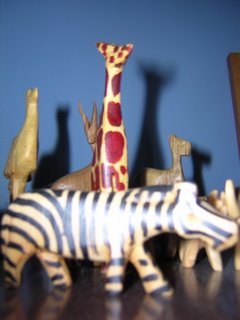Fogs
 This one evokes the colors of holiday cheer. Or, at least, it evokes the color of cranberries, that bitter fruit (Vaccinium macrocarpon) reputed to be highest in anti-oxidants and a good source of vitamin c (citric acid). Also, how shall we say, known as a fine source of regularity. But these are not cranberries, merely their color. This maroonish red is not so uncommon in nature that it doesn't appear in tree leafs and flowers and fruit and plant matter. Here, as a variant of clover (Lespedeza ...), it is really the patterns of stem and stalk I was after. The structure holding up the leaf and flower. Its straight angularity and the many angles covered, plus the odd focus on the background, where galaxies of leaves cluster together without worry. Everything is reducible to something, but that being so doesn't mean the reduction is always more true than the whole. Water being water being three atoms in a molecule, is that molecule, not its pieces when it is water. How tight its bond? It requires the energy of the sun to break it.
This one evokes the colors of holiday cheer. Or, at least, it evokes the color of cranberries, that bitter fruit (Vaccinium macrocarpon) reputed to be highest in anti-oxidants and a good source of vitamin c (citric acid). Also, how shall we say, known as a fine source of regularity. But these are not cranberries, merely their color. This maroonish red is not so uncommon in nature that it doesn't appear in tree leafs and flowers and fruit and plant matter. Here, as a variant of clover (Lespedeza ...), it is really the patterns of stem and stalk I was after. The structure holding up the leaf and flower. Its straight angularity and the many angles covered, plus the odd focus on the background, where galaxies of leaves cluster together without worry. Everything is reducible to something, but that being so doesn't mean the reduction is always more true than the whole. Water being water being three atoms in a molecule, is that molecule, not its pieces when it is water. How tight its bond? It requires the energy of the sun to break it.  The water in some structures can be mineralized into silcates. This petrified wood had such an existence. What is permanent is form, substance changes, but only slightly. Wood become rock. Which is the truth here? Precisely why the cranberry stalks and leaves led me to pondering water and oxygen and reducibility can never be known, but once the can was opened, we knew the worms would crawl.
The water in some structures can be mineralized into silcates. This petrified wood had such an existence. What is permanent is form, substance changes, but only slightly. Wood become rock. Which is the truth here? Precisely why the cranberry stalks and leaves led me to pondering water and oxygen and reducibility can never be known, but once the can was opened, we knew the worms would crawl.Everything is once again nudged into a slow spin, like the mass of planets, but movable. The half-truths are massaged, the masses are led. What was once firm is negotiable; anything to save his presidency. They can convince themselves that this is their intended end-game, but we know better. And I shudder at the deaths still to come in the blinding wake of their ill-conceived war and war-like ways. The comfort of turning tides only heightens the anticipation of possible futures yet unspoken. What fools we are, Americans. What foolish myths we follow, what foolish days we lead.







